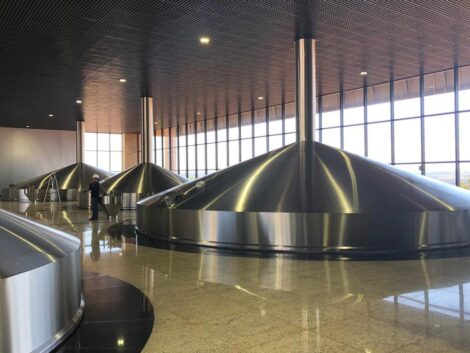Brewery fills nearly 6 million cans a day
Grupo Petrópolis achieved record beer production numbers after installing two new can lines and two returnable glass lines.
The brewery aims to increase its production capacity by 8.6 million hectoliters (or 860 million liters) of beer per year.
To achieve this objective, the group decided in 2019 to build a complete greenfield brewery in Uberaba, Brazil.
General contractor for the realisation was Neutraubling based Krones AG. The project included four filling and packaging lines: two can lines with a total capacity of 256,000 cans per hour and two returnable glass lines for 140,000 bottles per hour.
In addition, Steinecker supplied two identical Steinecker brewing lines, with a total of 40 tanks.
After ten months of project planning, order clarification, manufacturing, and assembly plus the shipping of some 900 containers and freight loads to Uberaba, installation began in early October 2019.
In September 2020, three weeks after the startup of the first can line, scaled to a capacity of 128,000 cans per hour, the operation reached 120,000 cans per hour in three shifts, reaching peaks of two hours in a row with maximum yield.
Two months later, new tests showed an average efficiency of 95%. The second line of cans, installed in November, performed 98.10% two weeks after the ramp-up.
The first glass line, in turn, had a startup in September 2020 with the 600ml bottles; the startup of the second glass line took place in February this year.
The initial numbers of the new factory are impressive. In early February 2021, the brewery achieved an output of almost 6 million cans filled in a single day on the two lines of Uberaba, a record for Grupo Petrópolis. The first tests already indicated a performance above the expected.
Diego Gomes, industrial director of Grupo Petrópolis, said: “Krones’ German technology allowed us to develop a brewery following the pillars of Industry 4.0, aiming at maximum productivity, minimum generation of industrial waste and respecting the best water and energy consumption practices.
“Our production lines were designed with a level of automation and digitalization that allows a predictive performance of our maintenance, monitoring and acting in order to maximize the useful life of our components and equipment.
“The efficiency of the lines of a factory like ours is 92%, that ensures world-class productivity.”








